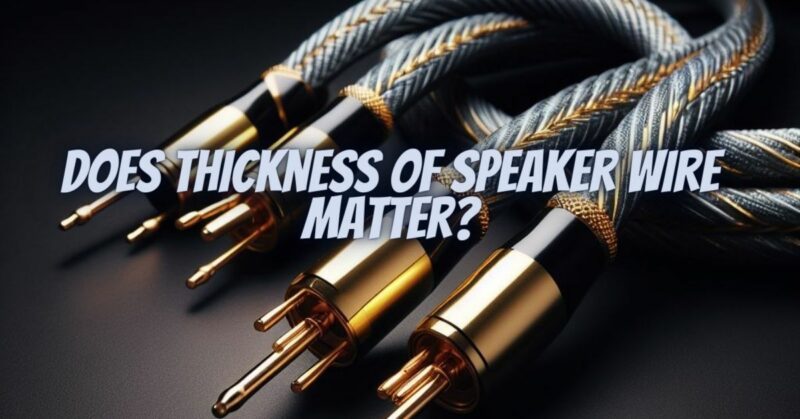The choice of speaker wire thickness is a topic of debate and curiosity among audio enthusiasts and those setting up sound systems. Does the thickness of speaker wire really matter, and if so, to what extent? In this comprehensive guide, we will delve into the intricacies of speaker wire thickness, its potential impact on sound quality, and the factors that should guide your decision when selecting speaker wire gauge.
Understanding Speaker Wire Gauge
Speaker wire gauge, often referred to simply as wire gauge, is a measurement of the wire’s thickness or diameter. It is typically expressed in American Wire Gauge (AWG) or as a numerical value. The AWG system assigns lower numbers to thicker wires. For example, 12 AWG wire is thicker than 16 AWG wire.
Key Considerations
Before exploring the effect of speaker wire thickness on sound quality, it’s essential to understand the key factors that should influence your choice:
- Resistance: The resistance of speaker wire is a crucial factor affecting audio quality. Lower resistance means less signal loss as the electrical current travels from the amplifier to the speakers. Thicker wire generally has lower resistance.
- Distance: The length of the speaker wire significantly impacts its resistance. Longer wire runs introduce more resistance, which can affect audio quality. Thicker wire is often used to reduce resistance over extended distances.
- Speaker Impedance: The impedance of your speakers matters. Lower-impedance speakers (e.g., 4 ohms) can benefit from thicker wire to minimize resistance, while higher-impedance speakers (e.g., 8 ohms) are less sensitive to wire gauge.
- Power Handling: Consider the power requirements of your speakers. High-powered systems may benefit from thicker wire to ensure efficient power transfer and minimize signal loss.
- Amplifier Output: The amplifier’s power output and impedance matching with your speakers are critical. Thicker wire can help ensure that the amplifier delivers sufficient power to the speakers.
Impact of Speaker Wire Thickness on Sound Quality
Now, let’s address the primary question: Does the thickness of speaker wire matter for sound quality?
- Short Distances: For relatively short speaker wire runs (typically under 20 feet or 6 meters) in a typical home audio setup, the difference in sound quality between thicker and thinner wire is often minimal and may not be audible to most listeners. Standard 16 AWG or 14 AWG wire is usually sufficient for such scenarios.
- Long Distances: In situations where speaker wire needs to span longer distances, especially in large rooms or home theater setups, thicker wire (e.g., 12 AWG or 10 AWG) can help reduce resistance over the extended length, potentially preserving signal quality and ensuring better audio performance.
- High-Powered Systems: High-powered audio systems, such as those used in professional settings or for large venues, can benefit from thicker wire to handle the increased power demands and reduce the risk of signal degradation.
- Audiophile Environments: Audiophiles with highly specialized equipment and a keen ear for audio nuances may notice subtle improvements in sound quality with thicker speaker wire. However, these improvements are often challenging to perceive for the average listener.
Practical Considerations
When selecting speaker wire for your audio system, consider the following practical tips:
- Match Gauge to Requirements: Choose a speaker wire gauge that matches the specific needs of your setup, considering distance, speaker impedance, and power requirements.
- Quality Matters: Invest in high-quality speaker wire with good insulation and conductive materials, as this can impact long-term durability and signal quality.
- Speaker Placements: Ensure that your speakers are appropriately placed and that the room acoustics are optimized, as these factors have a more substantial impact on audio quality than speaker wire gauge.
- Budget Considerations: Thicker wire tends to be more expensive. Evaluate your budget and priorities to strike the right balance between wire thickness and other audio system components.
In conclusion, the thickness of speaker wire matters in specific circumstances, depending on your audio setup and requirements. Thicker wire can offer advantages in scenarios where long distances, low speaker impedance, or high power are factors. However, for most typical home audio setups with short wire runs, the difference in sound quality between thicker and standard-gauge wire is often subtle or negligible. Making an informed decision based on your specific needs, budget, and priorities is essential, keeping in mind that factors like speaker placement and room acoustics have a more significant impact on overall audio quality. The choice of speaker wire thickness should be part of a holistic approach to achieving the best possible sound experience in your unique audio setup.


